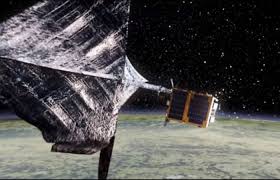
A small satellite has bene launched from the International Space Station (ISS) aimed to find out ways to clear space of debris. The small satellite is led by the UK and is the program has been codenamed RemoveDebris mission.
The job at the hands of the small satellite is a big one – it will conduct trials of the technologies that could someday in the future be put to use for cleaning up of the junk in orbit.
The space debris would be caught in a net that is carried by the satellite. It also carries a harpoon which would be used for firing at a target so that it can be proven that such projectiles has the capacity to be used effectively in a weightless condition.
The RemoveDebris satellite is weighs 100kg and is yet the largest satellite to be launched from the ISS.
The satellite was launched last week at a very strategic time which was carefully chosen so that the spacecraft would be in flight immediately over its control station situated in Guildford, southern England.
The signal from the spacecraft was picked by engineers when the satellite passed overhead the3 control station for the first time.
American space agency astronaut Ricky Arnold had captured the movie sequence. The astronaut managed to not only get on video a very good view of the RemoveDebris being launched form the ISS but he also managed to get a very identifiable shape of southern England and The Channel directly below the newly launched satellite.
The RemoveDebris was assembled at Surrey Satellite Technology Ltd and the project has its scientific leadership at the Surrey Space Centre, University of Surrey.
But there is technical help for the project from throughout Europe and about half of the total cost for the satellite at €15m (£13m) has been pooled by the European Commission.
before beginning its experiments, there would be a weeks of test and experimenting for the RemoveDebris spacecraft.
According to calculations, there is about 7,500 tonnes of old space hardware which are currently hurtling in orbit above the Earth.
Tools dropped by spacewalking astronauts, flecks of paint, bits that have fallen off satellites and old rocket segments are among the junk that is circling the Earth at present.
There is a rising concern that this junk objects are becoming abundant and could create a very realistic threat for a collision with satellites which are in operational missions for providing very important and critical services like telecommunications and environmental monitoring.
The designing of the RemoveDebris mission has been so done that it owul dbe bale to test relatively simple and hence low-cost ways for of cleaning up the debris in orbit over Earth.
There are other missions that would also attempt to put to use alternatives such as use of robotic arms which would be able to reach out and get hold of junk. But such efforts are considered to be quite complex and hence would also be more much more expensive to create and operate.
(Source:www.bbc.com)
The job at the hands of the small satellite is a big one – it will conduct trials of the technologies that could someday in the future be put to use for cleaning up of the junk in orbit.
The space debris would be caught in a net that is carried by the satellite. It also carries a harpoon which would be used for firing at a target so that it can be proven that such projectiles has the capacity to be used effectively in a weightless condition.
The RemoveDebris satellite is weighs 100kg and is yet the largest satellite to be launched from the ISS.
The satellite was launched last week at a very strategic time which was carefully chosen so that the spacecraft would be in flight immediately over its control station situated in Guildford, southern England.
The signal from the spacecraft was picked by engineers when the satellite passed overhead the3 control station for the first time.
American space agency astronaut Ricky Arnold had captured the movie sequence. The astronaut managed to not only get on video a very good view of the RemoveDebris being launched form the ISS but he also managed to get a very identifiable shape of southern England and The Channel directly below the newly launched satellite.
The RemoveDebris was assembled at Surrey Satellite Technology Ltd and the project has its scientific leadership at the Surrey Space Centre, University of Surrey.
But there is technical help for the project from throughout Europe and about half of the total cost for the satellite at €15m (£13m) has been pooled by the European Commission.
before beginning its experiments, there would be a weeks of test and experimenting for the RemoveDebris spacecraft.
According to calculations, there is about 7,500 tonnes of old space hardware which are currently hurtling in orbit above the Earth.
Tools dropped by spacewalking astronauts, flecks of paint, bits that have fallen off satellites and old rocket segments are among the junk that is circling the Earth at present.
There is a rising concern that this junk objects are becoming abundant and could create a very realistic threat for a collision with satellites which are in operational missions for providing very important and critical services like telecommunications and environmental monitoring.
The designing of the RemoveDebris mission has been so done that it owul dbe bale to test relatively simple and hence low-cost ways for of cleaning up the debris in orbit over Earth.
There are other missions that would also attempt to put to use alternatives such as use of robotic arms which would be able to reach out and get hold of junk. But such efforts are considered to be quite complex and hence would also be more much more expensive to create and operate.
(Source:www.bbc.com)





